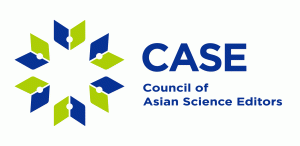Welcome to our first newsletter.
This newsletter is to keep you informed of the activities of Council of Asian Science Editors (CASE).
We hope you find this as a valuable information and your suggestions on this newsletter will be highly appreciated.
Thank you for your supports for CASE.
1. The establishment of CASE
CASE Presidential Address and Background of CASE Inauguration
July 2, 2014, Science and Technology Center, Seoul, Korea

Thank you very much, ladies & gentlemen, first of all, on behalf of all members of Korean CSE, I greet you all and welcome to the inaugural assembly meeting of Council of Asian Science Editors (CASE).
As you heard this morning, KCSE was established 3 years ago with the aim of fostering Korean Science journals through training and education, and therefore, main target of our activity was local science journals. However, KCSE was always keen to keep our ties with Asian editors and organizations. We believe that formal and informal collaboration among Asian science editors would be important for the improvement of Asian scientific research publication and could provide a synergistic effect.
As you all agree, Asian countries are putting more and more effort on science research, producing more papers than other region of the world.
Unfortunately, however, many of these works, especially high-quality works end up in non-Asian journals. At the same time the proportion of publications controlled by international publishing companies is becoming larger. I think this is about time for Asian science editors sit together and come up with some measures to turn around current trend.
As described in Background and purpose of the Council of Asian Science Editors (CASE) which, I am sure, you have read already, 16 Asian science editors get together October, 2013 and agreed on a number of matters, and one of them was the establishment of the Council of Asian Science Editors. After around one year preparation, we are very happy to propose official inauguration of CASE today. As a member of preparation committee for CASE, I am very proud to report upto now we have a total of 137 members from 21 different countries agreed to join CASE as you see in the list of membership of CASE.
I firmly believe that CASE will become a pivotal international organization for the development of Asian Science Journals.
Once again thank you very much for your support to the establishment of CASE.

Jong K. Ha
President, Council of Asian Science Editors
2. Background and purpose of the Council of Asian Science Editors (CASE)
In recent years, the quality of scientific research in Asia has continuously improved and, accordingly, scholars in Asia are publishing a greater number of research papers. However, because a majority of outstanding papers are being published in non-Asian journals, many of the research papers that are being published in Asia have not drawn the international readership that they deserve.
In order to continue the improvement of Asian scientific research publication necessary for international attention, all those who are involved in scientific research publication should work together; the cooperation of nations across Asia could have a synergistic effect.
Toward this end, the Korean Council of Science Editors (KCSE) has prioritized scholarly exchange among editors in Asia for several years. In particular, 18 editors from a few Asian countries gathered at the Korean Federation of Science and Technology Societies (KOFST) on October 1, 2013 and agreed that an organization dedicated to the advancement of scientific research publication across Asia is needed. Thus, the Council of Asian Science Editors (CASE) was conceived; after a year of preparations, CASE will be officially established during Asian Science Editor’s Conference & Workshop 2014 at a KOFST on July 2, 2014.
As a non-governmental, non-partisan, and non-profit organization, CASE aims to improve the quality of science journals published in Asia through consulting and information exchange regarding editing and publishing in order to contribute to the development of science and human well-being.
In addition to editors-in-chief, managing editors, manuscript editors, and anyone who is interested in science publication are also encouraged to participate in order to become current on recent information and technology related to scientific publication. It is hoped that many who are associated with the research publication process throughout Asia will show an interest and participate.
